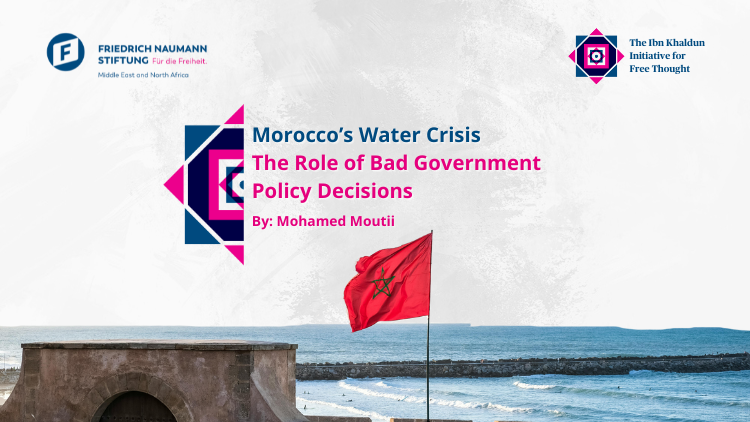Ibn Khaldun - Policy Brief
Morocco’s Water Crisis

Despite being hailed for its ambitious agricultural policies and modern water infrastructure, Morocco is now facing one of the most alarming water crises in the MENA region. Ranked among the countries with the lowest water availability per person, the Kingdom is grappling with severe droughts, shrinking aquifers, and growing public unrest. But what’s behind this crisis?
A new policy brief by Mohamed Moutii, “Morocco’s Water Crisis: The Role of Bad Government Policy Decisions,” challenges the dominant narratives and offers a sharp critique of the Moroccan government’s handling of water resources. The brief shows that while climate change plays a role, it is misguided public policy, not nature alone, that has deepened Morocco’s water woes.
From generous subsidies for water-intensive export crops like avocados and watermelons to the neglect of small-scale farmers and critical cereal production, the government's approach has prioritized short-term economic gains at the expense of long-term sustainability and food security. Even controversial mega-projects like the Green Morocco Plan and large-scale dam construction have failed to fix the core issue: mismanagement and inequitable water allocation.
In places like Zagora, residents suffer water shortages so severe they’ve taken to the streets in “thirst protests,” while commercial farms continue to thrive on taxpayer-subsidized irrigation.
This timely and provocative brief dives deep into:
- How Morocco’s agricultural subsidies are fueling unsustainable practices
- Why drip irrigation isn’t the solution it’s portrayed to be
- The social cost of inequitable water access in rural communities
- And what a market-driven, sustainability-focused water policy might look like
Read the full policy brief to explore the facts, challenges, and bold recommendations for change:
